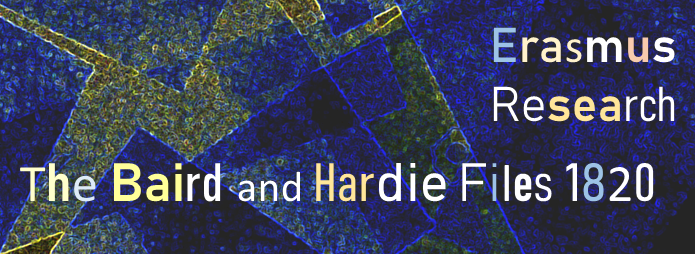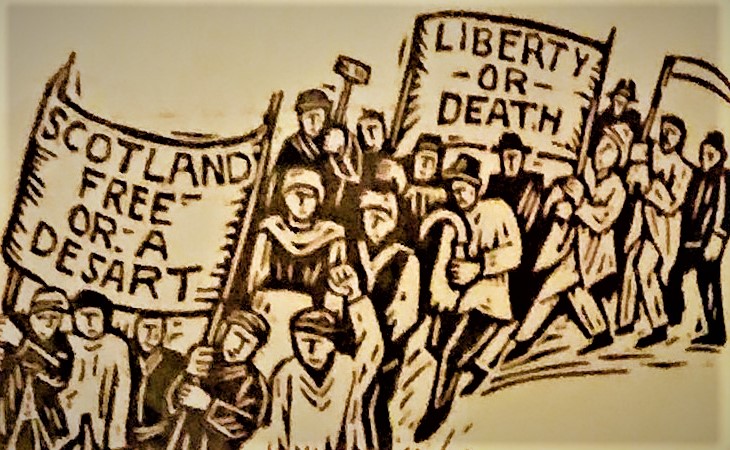This is the first section of Chapter II of the serialisation reproduced exactly as it appeared in the Stirling Sentinel, word for word, on Tuesday 19th February 1889.
CHAPTER II. 1794 – 1817
DR FORREST IN DANGER – HIS TIMELY FLIGHT – A STIRLING WEAVER IN TROUBLE – ANOTHER WEAVER BANISHED FROM SCOTLAND – AN INTERVAL OF PEACE – RENEWAL OF THE DEMANDS FOR REFORM – POPULAR EXCITEMENT- THE GLASGOW MAGISTRATES PREPARED TO SHOOT THE PEOPLE – GREAT METING AT THRUSHGROVE – THE SPY SYSTEM – ALEXANDER RICHMOND THE CAUSE OF BAIRD AND HARDIE’S SAD END – A MANUFACTURED “TREASONABLE OATH” – THE GOVERNMENT ALARMED – ACTION AGAINST THE GLASGOW “TRAITORS”.

Before passing from the events of 1794, we may mention that the Dr Forrest who was conspicuous in Stirling as a “Friend of the People” in these agitated times, was involved in the charge against Watt and Downie to a greater extent than we were aware of while writing the previous chapter. One night there arrived from Edinburgh two persons who put up at the “Saracen’s Head”, an inn at the head of the Friars Wynd, where the Bank of Scotland now stands. It consisted of an extensive range of buildings with a wide outside stair. In front, swinging between two pillars, was a hanging sign with appropriate figure-head and inscription, but being found rather startling to horses, it was taken down and put up on the gable of the inn.
When the building came into the market about 1833, the Stirling Guildry wanted to purchase it with the view of erecting a new Guildhall, but they were out-bid by the Bank of Scotland. In 1820, the year that Baird and Hardie were executed, the Saracen’s Head was kept by Willie Dow, but we are unable to say who was “mine host” in 1794, when the official-looking strangers we have mentioned drove up to the door. After being refreshed, they disclosed their errand. They were looking for the Radical doctor. They asked the waiter where Dr Forrest lived, and this question was overheard by a quick-witted chamber maid, who at once comprehended that the worthy doctor might find the strangers rather troublesome visitors.
Off she went, therefore, to give him warning. She had not far to go, as he lived in Baker Street, or Baxter’s Wynd, as it was then called, in a house which stood on the site of the property between Messrs Cullens’ and that belonging to Mr W. Boswell, bootmaker. Dr Forrest, knowing that he would be safer elsewhere, stepped quietly out by his back door and down through his garden, past the old Episcopal Church, and on to the north road; and it is said he did not stop until he reached the Sheriffmuir, where he remained in hiding for a time.
The baffled sheriff-officers had consequently to return to Edinburgh empty-handed. The doctor subsequently received information that he was no longer in personal danger, but would be required to give evidence for the Crown against Watt and Downie, and, as we have related, he appeared at their trials as a witness for the prosecution. He did not stay long in Stirling after this, but went south, and it is stated that on his tombstone, in a Border churchyard, is inscribed the line quoted by Burns from Pope – “An honest man’s the noblest work of God”. The name of the relief minister at St. Ninians who was mentioned in our introductory chapter was not M’Cross as appears in the report of the trials of Watt and Downie, but simply Cross.
The severity with which the sufferers of 1794 were treated did not extinguish Revolutionary ideas in Stirling. In 1798 a weaver named Robert Jaffrey got into trouble by giving twice as a toast at a party in a public house, “The old dog’s head cut off; the bitch hanged; and all the whelps drowned;” literally meaning, as the minor proposition of the indictment against his set forth, “Death and destruction to the king, queen and royal family”. At his trial for sedition, which is not reported, Jaffrey pleaded not guilty, but admitted (foolishly, in Lord Cockburn’s opinion) that he gave the toast libelled, but without any criminal intention whatever. Instead of simply recording this as a plea of not guilty, the admission was taken down and afterwards made a part of the prosecutor’s evidence. The jury by a plurality of voices found it proved that the panel proposed and repeated the toast libelled and with the meaning and intention libelled. Mark the plurality, says Lord Cockburn. “It was the first time that any portion of any Scotch jury was for acquitting any prisoner of any sedition”. Jaffray was sentenced by Lord Methven to keep the peace for one year, under the penalty of 100 marks (Scots), apparently a very lenient punishment considering the spirit of the age.

The last of the trials for sedition arising out of the French Revolution was that of Thomas Wilson, a Strathmiglo weaver, whose offence was aggravated by the fact that he was a volunteer, and the volunteer in those days not only took the oath of allegiance, but took the King’s pay, and were entrusted with arms for the very purpose of repelling the King’s enemies and maintaining the royal safety and authority. As Lord Cockburn remarks, “One of the indirect objects and tendencies of the institution of these bodies was to wean the popular mind from French politics, and to interest them in the war and in the internal peace of the country. Hence all disloyalty in that quarter was peculiarly dangerous and offensive”. Wilson was charged with saying to some shearers in a harvest field that he wished that the overthrow of the British Constitution might take place, and trusted that Bonaparte and the French would soon be over and bring about a revolution and put all things to rights. He was convicted and sentenced to a month’s imprisonment and two years’ banishment from Scotland. This took place in 1802.
The peaceful interval of fifteen years which followed Wilson’s trial is attributed by Tory writers to the salutary examples which had been made of sedition-mongers, but we think the true explanation is made by Lord Cockburn, who puts it so well that we cannot do better than quote his own words. “It is a poor delusion”, he says, “to suppose the sedition spirit inspired by the French Revolution was extinguished by Braxfield and his transportation. It died away because the irritation provoked by these trials grew fainter, and because the times changed. Facts abated the admiration with which enthusiastic men had beheld the opening of the French drama, a war which gave Britain the commerce of the world, and drove distress for a season from her subjects; terror of invasion united all ranks in defence of the country; the prostration of the rest of Europe, contrasted with our independence, withdrew public attention from the consideration of the sacrifices by which this glory was purchased; and the jealousy of even the popular parliamentary leader was lulled by the fear of dimming our warlike splendour in reference to abuses, which, though destined to provoke discontent as soon as they should be discussed, were allowed, as if by unanimous agreement, to accumulate round every part of our system in the meantime. These, and not the terrors of criminal law, were the causes of the fifteen years’ quiet which succeeded the judicial paroxysm that began in 1793”.
To be continued
The second part of Chapter II will follow on Thursday 9th April.
